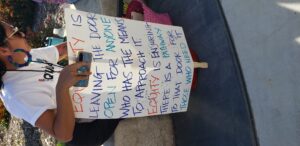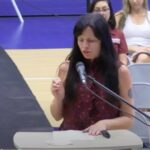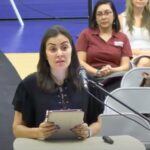by Natalie Hanson
posted Aug. 2
While Chico Unified’s school board finalizes a budget for the coming year, it also has approved a plan for using state funds to address academic achievement gaps.

Parents and educators, however, said as recently as school board meetings in late June that their requests for improving the district’s approach to equity for all students have gone unanswered.
The board approved an adjusted plan for the 2021-2022 academic year to address gaps in reading and writing among students of color, particularly English learners, at all grade levels, as part of the Local Control Accountability Plan process. (The LCAP involves the district’s plan for using state funding to identify areas of need and tackle learning obstacles.) The school board agreed to designate a so-called “equity lead” on every campus to handle diversity events and discussions.
The equity lead position created dissension at Rosedale Elementary that came to a head in late April when it became known that assistant vice principal and equity lead Joana Campos Castañeda had been placed on leave.
District administrators have told ChicoSol that they did not have an official description of the equity lead position. In response to the suspension of Castañeda, parents in May submitted a petition demanding more transparency and protection for equity leads. They asked the district to clarify the responsibilities of equity leads. School officials have not said if they will respond to this petition.
School board President Dr. Kathleen Kaiser said by phone the district follows state law to hold LCAP meetings at every school site to ask families and students for feedback on how student success is addressed.
But Rosedale parent Jeff Blake, in comments to ChicoSol, said he had been disappointed with the LCAP meetings. He called them “junk” because the district made claims about changes being made which he said could not be statistically proven.
Blake said when the school district presented statistics in LCAP meetings in March and April about having improved performance among some groups of students like English learners, he thought the data “had no statistical rigor to it.”
“There was no way of validating anything they were saying,” he said. “Nobody apparently did those tests to see if there’s any correlation or any significant change in performance. The only thing you can see is our English learners continue to struggle and suffer.”
Raquel Lee, program coordinator at Chico State’s Cross Cultural Leadership Center, is a volunteer administrator for the League of Stars program that connects high school and college students to local educators for mentorship. She spoke at a school board meeting on June 22, saying she hopes the district will expand LCAP to address more marginalized students.
Lee said the district has a lot of work to do after a meeting in 2020 where Chico Unified Educational Services Director John Shepherd brought together educators to discuss known equity gaps.
“A number of us were concerned that these gaps will grow, and/or not be adequately addressed,” Lee said.
At least one speaker pointed out the importance of investing in two-way immersion programs at Chico Unified.
Dr. Christine Leistner, who lectures on public health at Chico State, told the board they should be concerned about new statistics from the 2021 California Healthy Kids Survey that polled students.

“Thirty-five percent do not believe school staff examine their own cultural bias through professional development,” Leistner said. “Twenty-two percent believe staff do not think closing the ethnic achievement gap is a high priority.”
Leistner also said that administrators should be required to take bias training “to stop perpetuating harm,” and that she thinks in general the district must do more to prevent discrimination and harassment.
“What has been done since this report came out is by far not enough … some of it is damaging in some cases,” she said. “Multiple equity leads have been treated poorly for trying to implement changes with the goal of increasing equity in our district.”
The district has said they do not comment on personnel matters.
At least one Rosedale parent, Gina Bax, apparently disagrees. Bax told the board that as an immigrant who chose Rosedale for her children to be exposed to her language and culture, she does not appreciate the focus on “equity.”
(The district has defined equity as a way to improve all students’ ability to succeed academically, with interventions available when needed.)
“Unfortunately, past events in the name of equity have caused division and hate at a rate I have never seen in my school,” Bax said, adding that she thinks that educators should not be promoting “controversial issues and behaviors that are divisive and become confusing, especially in our Hispanic community.”

That day, the board held a 90-minute presentation to review how all students were doing and explain what the district would be doing next.
Chico Unified staff said that “bias awareness” and “micro aggression” training has taken place among faculty with a community panel. They added that there are “equity-focused groups” on some campuses, such as the Black Student Union and LGBTQ+ Allies, along with cultural celebrations like Día de los Muertos and Ballet Folklorico.
The LCAP plan will only be funded by $14.8 million this year — compared to $27 million last year. The largest expenditures this year will be $3.5 million for instructional aides, followed by about $2 million for elementary art and music education. The next steps are to address needs for each school site, according to the Equity Alliance’s report, and strengthen communication with Chico State.
Chico Unified spokesperson Erica Smith said by phone last week that the team of equity leads at each site, overseen by 14 district and office staffers, used up a one-year grant. She could not comment on whether the equity lead positions will be funded again, since they were not in the new LCAP allocations budget.
In the meeting to approve the new LCAP plan on June 29, Dr. Eileen Robinson acknowledged that the 108-page document is not user friendly. She said it took her several hours to read and understand it.
“That’s not good for getting the kind of participation we’re all anxious to have,” she said.
Robinson moved to approve the 2022-2023 LCAP proposal as amended, and it passed 3-1 with board Vice President Caitlyn Dalby absent and board member Matt Tennis opposed.
Natalie Hanson is a contributing writer to ChicoSol.

Does anyone else see the irony of $10’s of millions CUSD spends on architectural improvements to Chico schools and $0 spent on figuring out a way to make the empty temp classrooms in their service yard available to homeless families of CUSD students? I find that irresponsible to our Shelter Crisis.